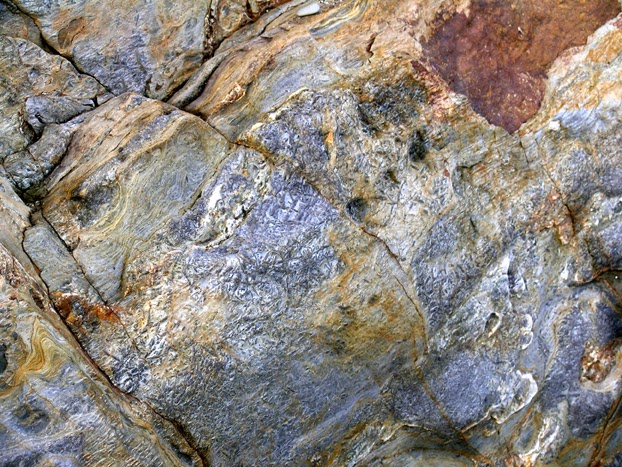I had been surprised at the mild weather throughout
autumn in Ireland, compared to the UK, and I wanted to make the most of my last
month and see some more places around Dublin. Now well into November, I made use
of the DART again to visit White Rock, at Killiney Beach.
 |
| Mica schist and aplite veins |
Although I only discovered this later, an excursion organised as part of the Education and Outreach services at the Geological Survey of Ireland, explores 500 million years of Earth’s history – from the Cambrian to the Quaternary periods – that can be found along this short stretch of coastline. Aimed at the general public, guided walks along this beach provide a good introduction to the rocks of Ireland.
My job, to survey this County Geological Site, required me only to look at the contact between the Leinster Granite,
which forms the Wicklow Mountains, and the Ordovician rocks into which it was
intruded in Devonian times.
 |
| Geology students from University College Dublin |
Never knowing quite what to expect when seeing some new geology, the jagged outline of what I presume to be White Rock gleamed in the afternoon sunshine and forms a spectacular local landmark. Much to my surprise, I wasn’t the only person there and I had arrived at the same time as students from University College Dublin, who were looking closely at the rocky cliffs.
 |
| Mica schists and granite at Killiney Beach |
It is an excellent example of contact metamorphism, with mica schists displaying several growths of the mineral andalusite along the plane of cleavage and larger joints - and other structural features that show the metamorphic fabric of the Ordovician rocks.
 |
| Mica schist with andalusite |
Diverging upwards, away from the main body of the granite - comprising quartz, white feldspar and white mica - thick veins of aplite and pegmatite pervade the schist. Here, the different rates of the cooling of the magma, and how this affects the size of the crystals and textures, can easily be demonstrated. Although never being as well developed as in such places as Glendalough, lead and copper were once mined here and a disused and inaccessible old adit can be seen in the cliff.
 |
| A view from White Rock towards Killiney Beach |
